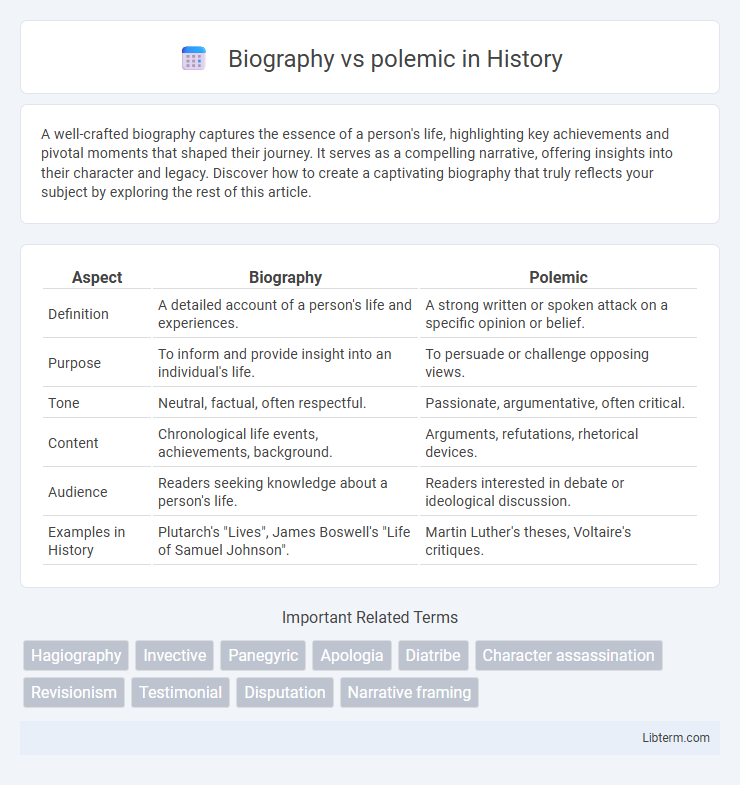A well-crafted biography captures the essence of a person's life, highlighting key achievements and pivotal moments that shaped their journey. It serves as a compelling narrative, offering insights into their character and legacy. Discover how to create a captivating biography that truly reflects your subject by exploring the rest of this article.
Table of Comparison
| Aspect | Biography | Polemic |
|---|---|---|
| Definition | A detailed account of a person's life and experiences. | A strong written or spoken attack on a specific opinion or belief. |
| Purpose | To inform and provide insight into an individual's life. | To persuade or challenge opposing views. |
| Tone | Neutral, factual, often respectful. | Passionate, argumentative, often critical. |
| Content | Chronological life events, achievements, background. | Arguments, refutations, rhetorical devices. |
| Audience | Readers seeking knowledge about a person's life. | Readers interested in debate or ideological discussion. |
| Examples in History | Plutarch's "Lives", James Boswell's "Life of Samuel Johnson". | Martin Luther's theses, Voltaire's critiques. |
Understanding Biography and Polemic
Biography provides a detailed and factual account of an individual's life, emphasizing chronological events, personal experiences, and achievements to offer a comprehensive understanding of their character and impact. Polemic, by contrast, presents a strongly argumentative and often controversial viewpoint aimed at persuading or challenging prevailing opinions about a subject, frequently highlighting conflicts or critiques rather than balanced narratives. Understanding the distinct purposes and methods of biography and polemic helps readers critically assess sources, recognizing biographies for depth and context while viewing polemics through the lens of rhetorical intent and argumentative bias.
Defining Biography: Purpose and Features
Biography serves to chronicle an individual's life, emphasizing factual accuracy and chronological events, with the primary purpose of informing and preserving historical or personal legacy. Its features include a structured narrative, comprehensive detail, and an objective tone that prioritizes verifiable information over subjective judgments. Contrastingly, polemic aims to persuade or criticize, often utilizing biased arguments and emotive language rather than balanced storytelling.
What Constitutes a Polemic?
A polemic is a strong verbal or written attack on a particular opinion or doctrine, characterized by its aggressive and contentious tone aimed at persuading or refuting opposing views. Unlike a biography, which objectively narrates the life and experiences of an individual, a polemic centers on argumentative rhetoric designed to provoke debate or challenge established beliefs. Key elements that constitute a polemic include deliberate use of persuasive language, selective presentation of facts, and a focus on controversy rather than neutral storytelling.
Historical Origins of Biography and Polemic
Biography originated in ancient Greece and Rome as a means to document the lives of notable individuals, emphasizing factual storytelling and moral lessons. Polemic emerged as a form of aggressive argumentation in classical rhetoric, aimed at disputing ideas or defending viewpoints through controversy. While biography prioritizes impartial narrative and character analysis, polemic centers on persuasive criticism and ideological conflict rooted in historical discourse.
Key Differences Between Biography and Polemic
Biography presents a factual and chronological account of an individual's life, emphasizing verified events and personal achievements. Polemic, by contrast, is a form of writing designed to argue a specific point of view, often involving controversial or critical perspectives aimed at disputing opposing ideas. While biography seeks to inform and document with objectivity, polemic intends to persuade or provoke debate through subjective and argumentative language.
Writing Styles: Narrative vs Argumentative
Biography employs a narrative writing style that emphasizes storytelling with chronological events, character development, and descriptive detail to engage readers emotionally and provide a comprehensive view of a person's life. Polemic uses an argumentative style focused on logical reasoning, evidence presentation, and persuasive techniques to challenge opposing views and influence opinions. The narrative style builds empathy and context, while the argumentative style prioritizes clarity and impact in persuading the audience.
Influence on Audience Perception
Biography shapes audience perception by providing a comprehensive and nuanced portrayal of an individual's life, emphasizing factual events and personal development. Polemic influences perception through persuasive rhetoric and strong opinions, often aiming to challenge or provoke the audience's beliefs and attitudes. The distinct approaches of biography and polemic result in differing levels of emotional engagement and critical reflection among viewers or readers.
Famous Examples of Biographies and Polemics
Famous biographies like Walter Isaacson's "Steve Jobs" and Robert Caro's "The Years of Lyndon Johnson" offer in-depth, meticulously researched portrayals of influential figures, emphasizing factual narratives and personal growth. In contrast, polemics such as Christopher Hitchens' "God Is Not Great" and Gore Vidal's essays challenge prevailing ideologies with provocative arguments and rhetorical strategies aimed at stirring debate. Both genres shape public opinion--biographies by humanizing subjects through detailed storytelling, polemics by confronting societal norms through critical discourse.
Ethical Considerations in Both Genres
Biography demands strict adherence to factual accuracy and respect for the subject's privacy, ensuring ethical responsibility in portraying a balanced and truthful narrative. Polemic writing involves intentional bias and persuasive tactics that raise ethical concerns about misrepresentation and potential harm to reputations. Both genres require critical reflection on the impact of disclosure and the ethical boundaries of authorial intention.
Choosing the Right Approach: When to Write Biography vs Polemic
Choosing between biography and polemic depends on the writer's intent and target audience; biographies provide a comprehensive, nuanced exploration of an individual's life and achievements, ideal for readers seeking factual and balanced narratives. Polemics focus on strong opinions and arguments, often addressing controversial topics or challenging established views, making them suitable for engaging readers interested in debate and provocative issues. Understanding the purpose--whether to inform with detailed life stories or to persuade with critical viewpoints--guides the decision to write biography or polemic.
Biography Infographic

 libterm.com
libterm.com